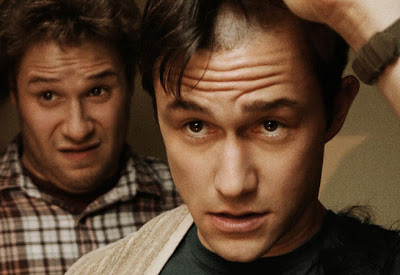I find it hard to believe that this film even looked good on paper.
Essentially it's a cinematic version of a vaudeville show with a young(ish) Bob Hope (making his feature length movie debut) filling in the gaps between the acts by pretending to be a radio announcer hosting the world's most implausible broadcast. I appreciate that radio was still a relatively new medium in 1938 but I can't imagine anyone in the audience was sufficiently baffled by the technology to believe that this is how a radio show was put together.
The premise is that Hope (as Buzz Fielding) is hosting a special radio show from on board the luxury ocean liner SS Gigantic which is racing its rival, the SS Colossal, across the Atlantic from New York to Cherbourg. His efforts are hampered by the presence of his three ex-wives, his fiancee Dorothy (Dorothy Lamour), SB Bellows (WC Fields) the eccentric brother of the Gigantic's owner, and Bellows accident-prone daughter Martha (Martha Raye).
The more I see of WC Fields on screen the more puzzling his success becomes. He's largely incomprehensible here, and much of his act (involving a bent snooker cue) is so old it had whiskers even in 1938. He behaves as if he's in another film entirely, and the overall perception is of selfish self-indulgence. Fields does what he wants to do and to hell with the rest of the cast who've got to work with him.
Funnier by far than Fields or Hope is second billed Martha Raye who uses her somewhat unusual looks to her advantage here. Not only is her character accident prone but she's ugly. She has a face that literally shatters mirrors, a mouth as wide as the Lincoln Tunnel, and a voice as loud as a fog horn. She's neither dainty nor shy and retiring and is decidedly asexual and director Mitchell Leisen takes full advantage of her 'game for anything' attitude. In one incredibly energetic and acrobatic song and dance number she is thrown, spun around and dropped like a sack of potatoes by a troupe of dancing sailors, singing all the while. It's worth watching the sequence on frame by frame advance just to see if she actually injures herself at any point while being hurled around the set.
 The other acts are decidedly more genteel. Kirsten Flagstad from the Metropolitan Opera Company belts out Wagner's most famous aria, while Shep Fields and his Rippling Rhythm Orchestra accompany an animated sequence involving a dancing splash of water which is considerably less entertaining than it may sound.
The other acts are decidedly more genteel. Kirsten Flagstad from the Metropolitan Opera Company belts out Wagner's most famous aria, while Shep Fields and his Rippling Rhythm Orchestra accompany an animated sequence involving a dancing splash of water which is considerably less entertaining than it may sound.Despite the decided averageness of the entertainment on offer THE BIG BROADCAST OF 1938 has earned a small place in movie history as the vehicle which launched Hope's future theme song 'Thanks for the Memory' and he sings it beautifully, duetting with Shirley Ross in a performance impressively devoid of showbusiness schmaltz or over-singing. This routine alone is worth the price of admission and, with a little concentration and selectivity, it could be the only thing you remember this film for.














